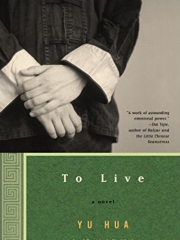To Live by Yu Hua
This book should be titled “A Series of Unfortunate Events” or “100 Different Ways to Die.” The story is somber throughout, but it is narrated by an old man who has come to terms with his past and does not dwell on the tragedy of it all. Overall, the underlying motifs are strongly Chinese – focusing on family and the value of hard work.
1) “And so the people in the village knew that the man who told dirty stories and sang sad songs had come back again. Actually I learned all those dirty stories and sad songs from them. I knew everything that interested them, and naturally this was also what interested me.”
How to influence people 101.
2) “As I asked, my father-in-law’s face would look like a preserved egg.”
Yu Hua uses very interesting metaphors. This is one of the most head-scratching ones. Maybe it made more sense in the original.
3) “I wondered how many people had died of exhaustion for my ancestors to make this money. It was then that I figured out why my father had insisted on copper coins and not silver: he wanted me to understand this truth. He wanted me to know that money does not come easily.”
Copper coins -> checks -> wire transfer -> Venmo -> blockchain (?)
4) “As soon as the packages of flatbread hit the ground, our brothers dived recklessly on top like animals trying to get their share. The way they piled on top of one another, layer after layer, was exactly how my mom used to weave the soles of my shoes. The way they screamed was no different from a pack of wild wolves.”
Great imagery of war.
5) “As soon as Jiazhen and I started discussing giving her away, Fengxia would come over and stare at us. Her two eyes would blink and our hearts would want to break, and we wouldn’t bring it up again for a couple of days.”
Communication isn’t all about the words.
6) “Who could have known that before long even cooking pots would have to be turned over to the people’ commune? They said it was to smelt iron.”
This book is well regarded for its portrayal of life during different periods of modern China. There’s no explicit mention, but this was the failed steel production scheme of the Great Leap Forward, from the lens of a poor family in a rural village.
7) “That day I went into town to sell firewood, and on the way home I bought Youqing five fen worth of candy. This was the first time I had bought anything for my son. I felt I should show Youqing that I loved him.”
Because Asian parents cannot say “I love you.”
8) “Everybody watched as the Red Guards shouted slogans and marched off with a look of murder in their eyes. Not a single person went up to try to stop them. No one had that kind of courage.”
The Cultural Revolution is really the forgotten Holocaust.
9) “When summer came, their house was filled with mosquitoes, and they didn’t have a mosquito net. As soon as it got dark, Erxi would have Fengxia sit outside in the cool night air while he lay down in bed to let the mosquitoes feed on him.”
Do mosquitoes really get full?
10) “When these chickens grow up they’ll become geese, and when the geese grow up they’ll become lambs. When the lambs grow up they’ll turn into oxen. And us, we’ll get richer and richer.”
My favorite line of the book.
I wish I had read this book in Chinese. It definitely feels like a lot was lost in translation. I’ll most likely read one of his other books once I find a Chinese version.
